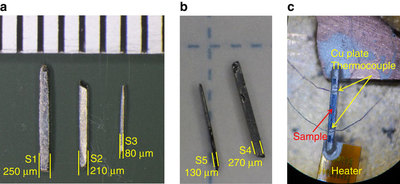PRESS RELEASE
- Research
- 2016
Colossal Seebeck effect enhanced by quasi-ballistic phonons dragging massive electrons in FeSb2
Authors
H. Takahashi, R. Okazaki, S. Ishiwata, H. Taniguchi, A. Okutani, M. Hagiwara & I. Terasaki
Abstract
Phonon transport is an essential property of thermoelectric materials. Although the phonon carries heat, which reduces the thermoelectric efficiency, it contributes positively to the Seebeck coefficient S through the phonon-drag effect, as typified by the high-purity semiconductors, which show fairly large S at cryogenic temperatures. Although such a large S is attractive in terms of Peltier cooling, a clear guiding principle for designing thermoelectric materials enriched by the phonon-drag effect remains to be established. Here we demonstrate that a correlated semiconductor, FeSb2, is a promising thermoelectric material featuring quasi-ballistic phonons dragging d electrons with large effective mass. By changing the sample size within the sub-millimetre order for high-purity single crystals, we succeed in substantially increasing S to as much as −27 mV K−1 at low temperatures. Our results exemplify a strategy for exploring phonon-drag-based thermoelectric materials, the performance of which can be maximized by combining heavy electrons with ballistic phonons.

(a) Sample dimensions of S1, S2 and S3, which have cross-sections of 250 × 245 μm2, 210 × 205 μm2 and 80 × 160 μm2, respectively. (b) Two samples, S4 and S5, with cross-sections of 270 × 250 μm2 and 130 × 150 μm2, respectively, are obtained by dividing a single crystal. (c) Measurement system for Seebeck coefficient S and thermal conductivity κ. The sample is attached to the heater and Cu plate by silver paste (DuPont 4922N), with thermocouples on both ends. We measure the thermoelectric voltage of chromel-constantan thermocouples to evaluate the temperature difference and thermoelectric voltage of the sample using chromel wires.
Nature Communications: http://www.nature.com/ncomms/2016/160906/ncomms12732/full/ncomms12732.html

